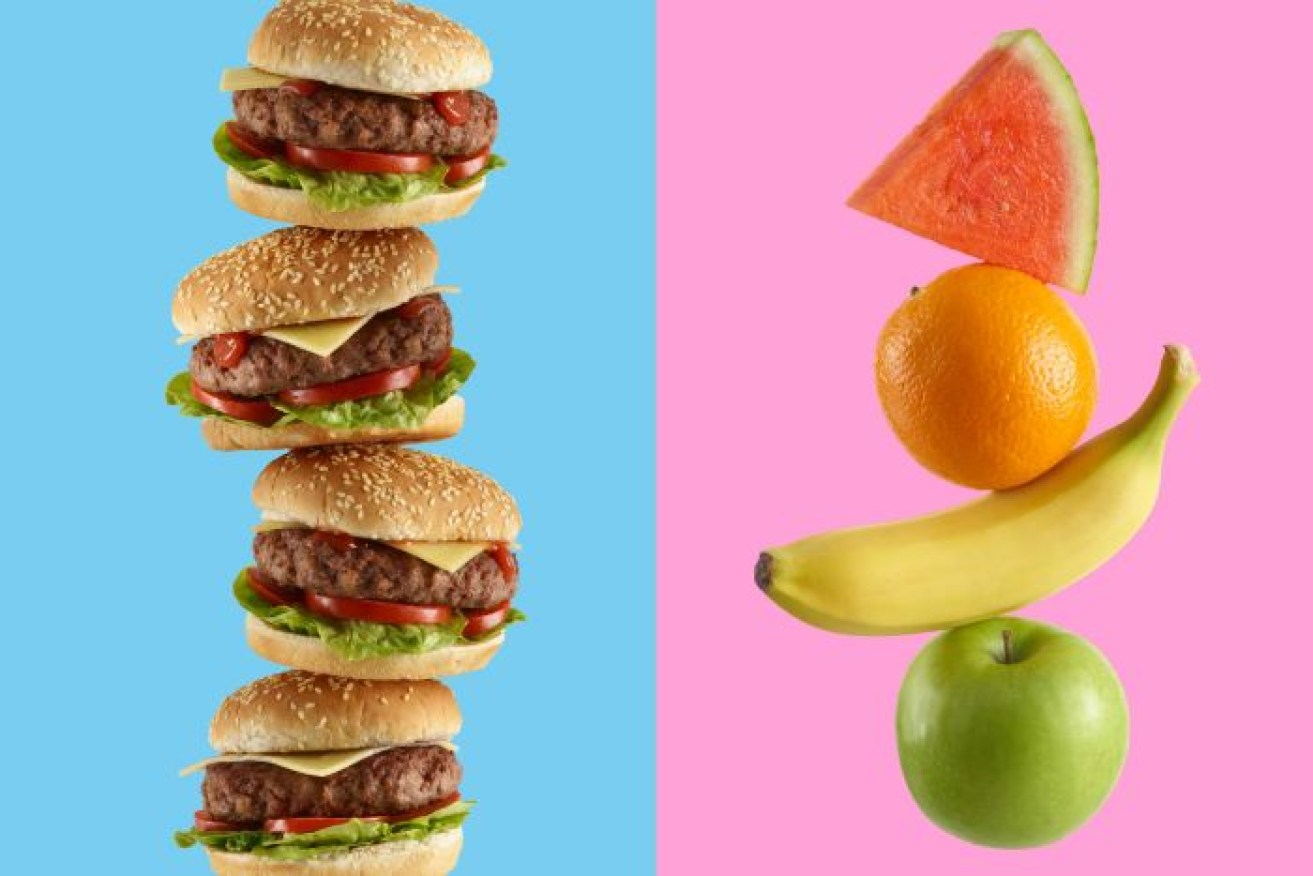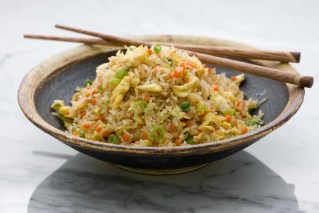Processed food leads people to eat more and put on weight, study finds

Processed foods have long been blamed for the obesity epidemic. Photo: Getty
It seems like research that should surprise no-one: when people eat lots of highly-processed food, they’re more likely to gain weight.
Why? Well, it turns out the usual suspects — sugar, salt and fat — aren’t solely to blame.
In a small study published today in the scientific journal Cell Metabolism, 20 people spent two weeks eating either a highly-processed or unprocessed diet, before swapping diets.
Despite the two groups’ meals and servings being carefully matched, calorie for calorie, participants consumed more food and gained weight while on the ultra-processed diet, said lead author Kevin Hall.
“I thought that if we matched the two diets for components like sugars, fat, carbohydrates, protein and sodium, there wouldn’t be anything magical about the ultra-processed food that would cause people to eat more,” said Dr Hall, senior investigator at the US National Institute of Diabetes, Digestive and Kidney Diseases.
“We found that, in fact, people ate many more calories on the ultra-processed diet, and this caused them to gain weight and body fat.”
Studying dietary habits is complicated and often limited by self-reporting, so it’s been difficult for researchers to establish a direct connection between highly-processed foods and obesity.
Although the study was relatively small, as well as short, Dr Hall said it was the first to establish a clear cause-and-effect relationship between processed foods, increased calorie consumption and weight gain.
“Even more importantly, that causal relationship didn’t necessarily have to do with the nutrients that we always suspected might be driving that relationship: salt, sugar and fat,” he said.
“It suggests there is something that we still don’t understand about ultra-processed food … that is driving a very large effect on why people tend to overeat [it].”
Processed food drives increased consumption
The researchers enrolled 20 healthy volunteers who were given three meals a day and had access to either ultra-processed or unprocessed snacks, as well as water.
Every meal was carefully matched to a counterpart meal (in the opposite diet) to ensure carbohydrate, fat, protein, sugar, fibre, and sodium levels were equal, and the total calorie count was the same in both meals.
A typical breakfast in the ultra-processed diet consisted of Honey Nut Cheerios, whole milk with added fibre, a packaged blueberry muffin, and margarine.
In the unprocessed diet, breakfast included a parfait made with plain Greek yogurt, strawberries, bananas, walnuts, salt, and olive oil, and apple slices with freshly-squeezed lemon.
The participants were told they could eat as much (or as little) as they wanted, and the researchers measured how much they consumed.
During two weeks on the ultra-processed diet, participants ate an average of 508 more calories per day (that’s about a quarter of recommend daily consumption). They also gained, on average, almost one kilogram.
In contrast, they lost the same amount of weight, on average, during their two weeks on the unprocessed diet.
Importantly, participants reported that both diets tasted good — so they weren’t just eating less on the unprocessed diet because they didn’t like the food.

A typical breakfast and lunch from the ultra-processed menu (L) and unprocessed menu (R). (Supplied: NIDDK)
Tracy Burrows, an associate professor of nutrition and dietetics at the University of Newcastle, said although the study was “very novel”, the weight differences observed were minimal.
“There’s so many influences on somebody’s weight status, that 0.9kg is not very much,” said Dr Burrows, who was not involved in the research.
“Whilst it’s reported as significant … the actual amount is insignificant.”
But Dr Hall disagreed, and said the duration of the study was the reason more considerable weight change wasn’t observed.
“The point is, when we look at the calorie differences between what people are eating, those are persistently different over the course of the month-long experiment, and they’re substantial,” he said.
“You would expect if we were to run this study out for three or four months, these weight differences would have continued to accumulate.”
Similarly, because the participants were healthy and the testing period lasted only a month, the researchers didn’t observe any significant differences in other measures of health.
Speed eating leads to over eating
As for why the study participants consumed more food and ultimately gained weight while on the ultra-processed diet, Dr Hall and his colleagues had several ideas.
They found that when people were on the ultra-processed diet, they tended to eat faster — potentially not allowing enough time for their body to signal to their brain that they were full.
“There may be something about the textural or sensory properties of the food that made them eat more quickly,” Dr Hall said.
This, in turn, he said, could easily lead to overeating.
Another factor that appeared to play a role in higher calorie consumption was the higher calorie density of processed food.

Daily snacks on the unprocessed menu included fresh fruit, raisins and nuts. (Supplied: NIDDK)
“The solid foods were 85 per cent more calorie dense in the ultra-processed diet compared to the unprocessed diet,” Dr Hall said.
“Given that they’re smaller portions, if you eat anywhere near the same number of grams of those foods, you will receive naturally more calories.”
Less clear, Dr Hall said, was the biological changes they observed that might also contribute to changes in calorie consumption.
“When people consumed the unprocessed diet, for reasons that we don’t fully understand, the levels of an appetite suppressing hormone that’s produced by the gut went up,” he said.
“Similarly, a hormone that increases hunger … went down during the unprocessed diet.”
The role of processed food
Dr Burrows said more research was needed to support the findings of the trial and make them generalisable to the wider population.
“It’s a really exciting study that provides preliminary investigation … but because it’s a small study in an inpatient setting, it has its limitations,” she said.
Since the food was prepared for the participants, it didn’t take into account convenience and cost — two significant factors when it comes to peoples’ diets.
“We know there are a lot of factors that contribute to why someone might choose an ultra-processed meal over and unprocessed on,” Dr Hall said.
“For people in lower socio-economic brackets especially, we need to be mindful of the skills, equipment, knowledge, and expense needed to create unprocessed meals.”
Even while preparing the food for the study, the researchers found the weekly cost of the ingredients for the unprocessed diet was nearly 50 per cent higher: $US151 vs $US106.
Dr Burrows agreed, and said it was important not to dismiss processed food altogether.
“This study is focused on ultra-processed foods … but processed food can also mean raw foods that have just been processed to make them more edible and consumable,” she said, offering Weet-Bix as an example of a processed food that could still be a healthy choice.
“You can’t eat wheat straight from the field. They’ve just processed it so it’s in a more edible format.”
Dr Hall added that the study’s findings raised interesting questions about the role of ultra-processed foods in other diets.
“People seemed to have vehement arguments about what diet is best for weight loss, whether it be low carb, keto, low fat, or vegan.”
Despite the differences between these diets, he said, they all have one recommendation in common: to decrease consumption of ultra-processed food.
“When you have a success story of somebody on a low carb or low-fat diet, were they successful because they cut the carbs or the fat, or was it because they reduced the ultra-processed food?”
– ABC








